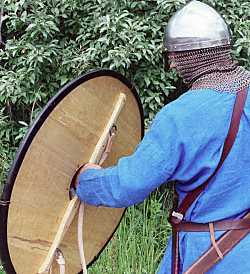ll three of the QMs are nervous about moving to an amalgamation of systems, the majority element of which (MM) is unfamiliar to all of us. Getting input from people who are familiar with it is priceless.
Next thing next: I'm not sure I agree with you on the above. To be honest, that all sounds like more work as opposed to less. 'Work' in this context means making judgement calls;
I will admit that I'm typically used to GMs making "Judgement Calls" fairly quickly. At the gaming table, I'm really quick about that kind of stuff as a GM, so perhaps there's bias there.
Then again, I completely forgot that there actually would be limitations to having
Three Quest Masters - any judgement calls you make would neccessitate a vote of all three, and thus clogging things up because you would need to reach a consensus rather than be able to make the snap-calls that the traditional, singular GM would be capable of.
In the future, I'll try and keep that in mind, so thanks for that heads up!
Of course, I can't really help much about your lack of familiarity with the game. Honestly, the best way to learn a game like M&M would be to play it, not GM it for a game as demanding as Marked for Death. I do not envy you guys.
Though, now I have to wonder: All you QMs out there (
@OliWhail,
@eaglejarl,
@Velorien), what are the TT RPG systems you are most familiar with, anyways?
The XP curve.
@OliWhail deserves all the credit for this one, as he's the one who did all the work. He created a spreadsheet (well, multiple candidates, settling on one final version after some discussion) that specifies that an average ninja (aka a "50%er") gets N XP per day, a top-level genius (99%er) like Itachi gets M XP / day, and people in the middle (e.g. 60%ers, 75%ers, etc) get A, B, C ... XP / day. Once we got that sheet put together it made XP assignments a breeze.
What's a reasonable number of XP to award for this update, given that we're trying to be stingy?
Okay, I think I understand why the previous system found Exponential Growth manageable... you figured out programs to do the work for you. As a computer engineer, I can dig it.
Frankly, I think this is the serious issue with using M&M - the system just
doesn't support an exponential growth curve for Costs without effecting
everything because of the math inherent to the system.
By changing how much things cost... you're effectively changing how things that make M&M a convenient system to run like Power-Stunting, Inventing, Rituals and Artifice, and all that stuff works. Stuff that we would be using all the bloody time because of how Hazou was built in MfD.
By turning
all PP costs into exponential growth curves, you've neutered anyone who uses the Artificer/Inventor/Ritualist rules, because then all the DCs for design/construction become prohibitively difficult and extremely expensive.
Power Stunting also becomes a chore because of the additional math involved in ensuring you're not spending more PP than you have to work with due to the exponential growths mucking with things (again, simple algebra vs exponential math - which do you want to do as a player when coming up a plan quickly? I would say algebra).
My Suggestion for a Solution to that problem:
How about we just divorce character growth from character PP? M&M normally uses PP as both the resource you build your character with, as well as as the resource you gain as you gain experience.
I suggest we split the two into Power Points (PP) and Experience Points (XP). Let the Power Points remain as they are in standard M&M. So whenever we Power Stunt, design and make Inventions/Artifice or create Rituals, and stuff, we're using PP which make the game coherent and straightforward.
However, you would not gain PP the normal way described in the M&M rulebook - you would have to use Experience Points to pay for the PP you use to improve your stats.
XP could then be controlled in a more strict way, as is typical in MfD. You could go with the exponential growth costs method as done in the previous rule-iteration of Marked for Death, if that's preferable.
So buying 1 PP for a certain Ability/Skill/Power/whatever would have it's own XP requirement. My preference would be "If you want to get a PP for Stat Y that is Rank Z, then pay Z XP. You then pay PP to buy the Stat to rank Z+1 as standard M&M." Or you could assign a different formula, but it would have to be reasonably consistent, I suppose. Doable with a program, but still kind of kludgy for my tastes...
Or... you could do something like declare a table of "XP to PP" conversions, that make PP expensive to buy for certain things. Much simpler, IMO.
You could then say something like "Buying 1 PP of Ability is 10 XP" and "Buying 1 SP of Non-Combat Skill is 5 XP" and "Buying 1 PP of Advantage is 12 XP" or whatever.
Or you could combine both the "Exponential Growth" and "Cost Table" ideas. Not sure how, yet, but I bet it would be doable.
This way, all the QMs need to do is decide "how much should X be worth", "how much XP does JoeSchmoe earn a day/week/month", and "What do the idiot PCs want to buy with their XP anyways?"
I think this would help retain the simplicity of working with M&M, but also allow us to maintain that feel of "character growth is a grind" that Marked for Death has had in the past.
Would that be amenable?

